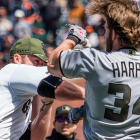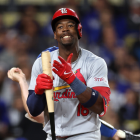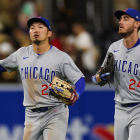Bryce Harper is the face of the sport baseball needs: Edgy. Funny. Transcendentally talented. And willing to rush in a fury at Hunter Strickland, fists flying, rage on full display.
In the fight that erupted Monday between the Washington Nationals star and the San Francisco Giants' long-simmering relief pitcher, we found two truths.
The first: The best of baseball -- how it's meant to be played, and how it can rise above the din and become sports' most relevant topic -- lives on, however tenuously.
The second: Major League Baseball, in the form of its commissioner, still doesn't get it. Not fully. Not the way it needs to, the way a beautiful sport requires if it is to have the level of success and relevance it deserves in an increasingly crowded and competitive world.
It was just last week that Rob Manfred, the same commissioner who suspended Harper four games for the most exciting thing to happen to the game this season, told tech news site Cheddar, "We need to be on multiple platforms to grow the game to its full potential, and I think you'll see us in the coming years continuing to experiment with ways to deliver our product to young people."
That was to explain why Major League Baseball, wisely, had agreed to stream 20 games this season on Facebook.
But here's a not-so-secret fact, commish, one the tech world shouldn't have to tell you: Young people live in the moment, and they crave authenticity, and they yearn for excitement. What they're looking for is Harper's fists flying -- and Strickland's, too -- and baseball selling the idea that players policing themselves isn't just great theater. It's a rich part of the history of the game that too-squeamish owners and commissioners have spent years trying to erase.

Suspend Harper for four games? For 36 innings? It's a start -- better, say, than Rougned Odor sitting eight games last year for slugging Jose Bautista. But I'd rather you embrace the game's most dynamic player, someone who told Little Leaguers this week not to accept participation trophies, someone who has correctly voiced the very-real fact the game needs to market itself better.
It's 2017. Get with the program.
This isn't just about the thrill of the fight, though that's certainly true, too. It's about Harper, and Strickland, playing out a saga once quite common in the game. Because the place to settle disagreements, slights real and imagined and revenge-is-a-dish-best-served-cold plots isn't in some office building in New York City. It's in those 60 feet, six inches somewhere between the plate and the mound. And the players know it.
"Yup," one former long-time player told me. "Harper had to get him. Bryce gained a lot of respect across the league."
And, as important, among fans across the country.
Rob Dibble, a bad boy of the game himself in his heyday and a thoughtful and interesting voice on the sport, told me succinctly: "Look up what Jake Arrieta said. Never a bad thing to have a little dust-up every now and then."
Ah, yes, Arrieta. He told this to 670 The Score in Chicago:
"I thought it was awesome. Every once in a while, it's refreshing to see two teams emotionally charged getting after it. And when something like that happens versus continuing to chirp and talk about it, why don't you go out there and see somebody? That's exactly what happened in the game yesterday."
This is good for the game, not bad. In fact, after Dibble's first take, he followed up with this text:
"I'll give you one more thought. Eric Yelding of the Astros charged me once when I threw behind him. He hit me with his helmet. I deserved it! I always said if you think it was intentional then come see me. He did, and I had total respect for that!"
Mark Cuban sure did. The Mavericks owner, baseball fan and a guy wanted to buy the Chicago Cubs tweeted about the brawl:
I've never been able to get my 7, 10 yr. olds to watch a baseball game. Ever They finally give in. Not 1 inning later. They loved it lol https://t.co/kOOEnrGXZ3
— Mark Cuban (@mcuban) May 29, 2017
So will other fans. There was a time when pitchers could fight for the inside part of the plate, or their respect, or their perceived dignity, or the honor of their teammates, and baseball understood. This is the game. There's a toughness and a bring-it bravado that once underpinned the finer and more subtle arts of baseball. That history needs to be embraced, not abandoned, especially when its most dynamic star is at the center of trying to revive it.
So while I credit Manfred for suspending Harper four games rather than, say, eight, I'd also offer this suggestion:
Next time wink to your players -- and fans -- and give Harper a one-game suspension. Let the message be, "This is our game, and we embrace it."






















